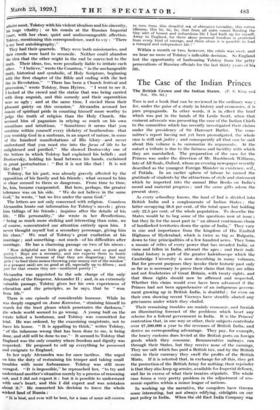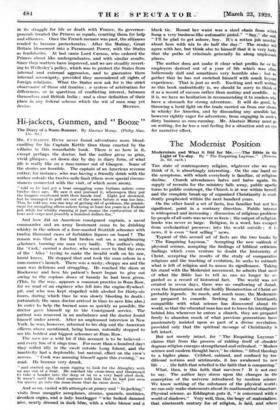The Case of the Indian Princes MIS is not a
book that can be reviewed in the ordinary way ; for, under the guise of a study in history and economies, it is pure propaganda. In other words, it is in effect the brief which was -put in the hands of Sir Leslie Scott, when that eminent advocate was presenting the case of the Indian Chiefs to the committee which has recently investigated their claims under the presidency of Sir Harcourt Butler. The com- mittee's report having not yet been promulgated, the whole case is still sub judice ; and consequently all that can be said about this volume is to summarize its arguments. At the outset a tribute is due to the fairness and lucidity with which they are marshalled. The preparation of the ease for the Princes was under the direction of Mr. Rushbrook Williams, late of All Souls, Oxford, whom an evening newspaper recently described as the youngest Foreign Minister in existence, mit, of Patiala. In an earlier sphere of labour he earned the gratitude of students by the attractions of style and statement which he imported into the annual Blue Books on India's moral and Material progress ; and the same gifts adorn the present story.
As every schoolboy knows, the land of Ind is divided into British India and a conglomerate of Indian States ; the latter occupying 38.8 per cent. of the total space but holding only 22.5 per cent. of the whole population. To describe the States would be to beg some of the questions now at issue ; but they lie for the most part in " an almost continuous chain of landlocked territories down the spine of India." They vary in size and importance from the kingdom of His Exalted Highness of Hyderabad, which is twice as big as Bulgaria, down to tiny principalities of a few hundred acres. They 'form- a mosaic of relics of every power that has invaded India, or risen and fallen in India, athwart the ages ; and their indi- vidual history is part of the greater kaleidoscope which the Cambridge University is now describing in many volumes. But for present purposes they invoke their historic past only so far as is necessary to prove their claim that they are allies and not feudatories of Great Britain, with treaty rights, and that those rights should now be affirmed and respected. Whether this claim would ever have been advanced if the Princes had not been apprehensive of an indigenous govern- ment growing up in British 'India, is doubtful ; for even on their own showing recent Viceroys have steadily abated any grieirances under which they chafed.
Their remaining troubles are mainly economic, and furnish an illiiminating forecast of the problems which beset any schethe for a federal governirient in India. It is the Princes' contention that, in one way or other, their subjects contribute over £7,500,000 a year to the revenues of British India, and derive no corresponding advantage. They pay, for example, the heavy customs dues levied at the British ports on foreign goods which they consume. Remunerative railways run through their States, but they receive none of the earnings. They use salt which has paid a British tax, and by the British coins in their currency they swell the profits of the British Mints. If it is retorted that, in exchange for all this, they get the protection of the British Army for nothing, their rejoinder is that they also keep up armies, available for Imperial defence.
and far in excess of what their treaties stipulate. The whole case forms a very pretty problem in the adjustment of tee,- nomic equities within a minor league of nations.
In working up the narrative, the compilers have thrown some interesting, but not always edifying, sidelights on our past policy in India. When the old East India Company was
in its struggle for life or death with France, its governor- generals treated the Princes as equals, courting them for help and alliances. Once the French menace was past, the alliances tended to become protectorates. After the Mutiny, Great Britain blossomed into a Paramount Power, with the States as feudatories. At last came Lord Curzon, who ordered the Princes about like undergraduates, and with similar results. Since then matters have improved, and we are steadily revert- ing to Wellesley's policy, which was to protect the States from internal and external aggression, and to guarantee them internal sovereignty, provided they surrendered all rights of foreign relations. What the States now ask for is the strict observance of those old treaties ; a system of arbitration for differences, or in questions of conflicting interest, between themselves and British India ; and a clear definition of their place in any federal scheme which the wit of man may yet

















































 Previous page
Previous page